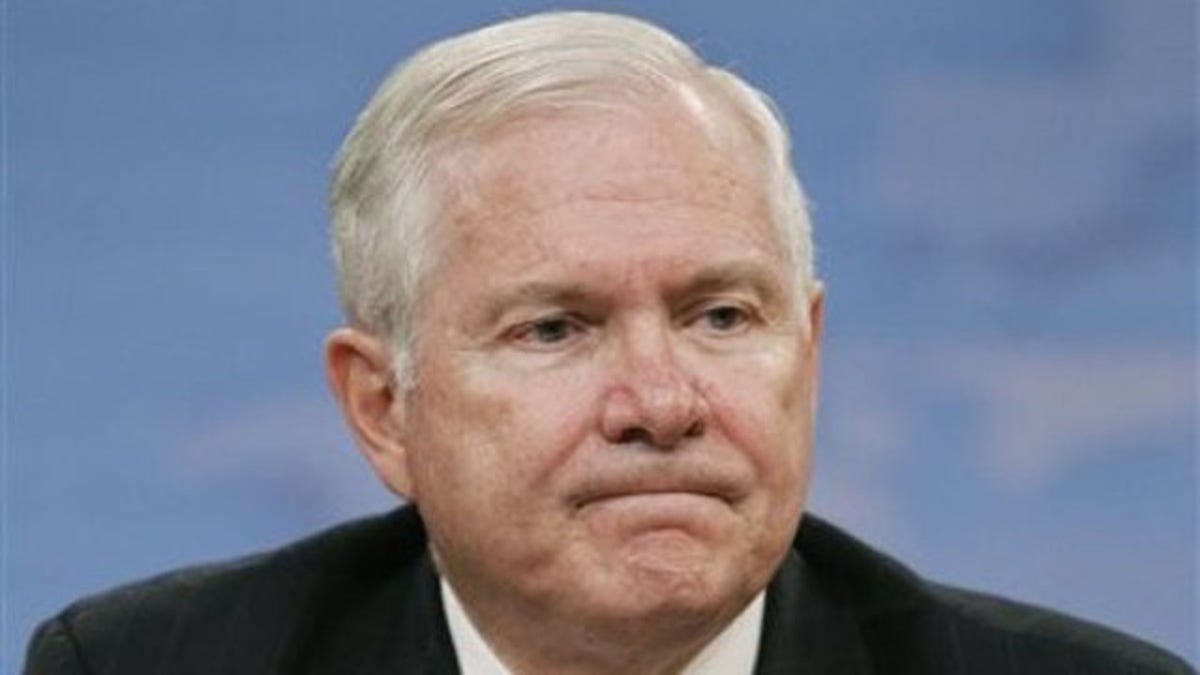
Aug. 9: Secretary of Defense Robert Gates pauses during a news conference at the Pentagon in Washington where he announced the cuts (AP).
Defense Secretary Robert Gates' call to eliminate a major military command has revived concerns from some lawmakers that the Obama administration could leave the country vulnerable by cutting too deep into military spending at a time when the nation is engaged in two wars and facing new threats abroad.
Though the Pentagon budget is expected to go up next year, Gates is trying to find billions in savings over the long term to pay for priority military investments. He has described his cuts as necessary and the targeted programs as wasteful or duplicating existing programs.
But the decision to cut the Joint Forces Command in Norfolk, Va. -- one of 10 major U.S. military commands -- is worrying lawmakers in Virginia and elsewhere who think the move could hurt national security. They said they appreciate the need to cut spending, but suggested that the sacrifice in Norfolk would be too great.
Gates estimated that the Virginia command accounts for 2,800 military and civilian positions, as well as 3,000 contractors, at an annual cost of $240 million. Some employees could be reassigned but many would have to find other positions or leave the Defense Department, according to Gates.
"We are at war abroad in multiple countries and closing the command where components from multiple branches of the military come together to provide intelligence and protection is the wrong decision," Virginia Gov. Bob McDonnell said, calling the center "key to America's national security."
The move to cut defense spending comes as the national deficit and debt soar, prompting urgent calls to balance the budget before the nation reaches a point where interest payments consume taxpayer dollars and other nations lose faith in U.S. financial stability. But it also comes as the U.S. military tries to escalate the war in Afghanistan and wind down the war in Iraq. It comes as once-overlooked Al Qaeda offshoots and affiliates plot new attacks on Western targets. It comes as U.S. officials express concern about China's military buildup and Iran's alleged pursuit of a nuclear weapon.
Some members of Congress cried foul last year when the administration announced cuts in missile defense as well as high-dollar, high-tech military hardware. Gates' latest proposals were met by similar skepticism this week.
"At the end of the day, Secretary Gates and his team will have to convince members of this committee that these efforts will not weaken our nation's defense," said Rep. Howard P. "Buck" McKeon, R-Calif., ranking Republican on the House Armed Services Committee. "Finally, how are we to be convinced that these savings will be reinvested into America's defense requirements and not harvested by congressional Democrats for new domestic spending and entitlement programs? This is already happening."
Virginia Rep. Eric Cantor, the House Republican whip, said Joint Forces Command is "essential" in an "increasingly dangerous world."
Cantor claimed that shuttering command would "compromise its vital national defense mission and jeopardize the joint ability of our Armed Forces to combat the growing threats of nuclear proliferation and global terrorism."
Gates, though, describes the command -- created to foster military cooperation -- as outdated, performing a task that is done throughout the military "as a matter of culture and practice."
"The department must start setting priorities, making real tradeoffs and separating appetites from real requirements," Gates said Monday.
Most of the cuts Gates announced this week were personnel-related. He called for sweeping cuts in defense contractors as well as a freeze on the growing number of senior leadership positions and written reports. In addition, the secretary said he's eliminating two other offices beyond Joint Forces Command.
Gates said the defense budgets project "modest but steady growth" and that he wants to make sure the U.S. does not make unwise reductions. He acknowledged the concerns lawmakers have expressed since he launched a crusade against defense overspending.
"Our country is still fighting two wars, confronts ongoing terrorist threats around the globe and faces other major powers investing heavily in their military," he said. "It is important that we not repeat the mistakes of the past, where tough economic times or the winding down of a military campaign leads to steep and unwise reductions in defense."
He continued: "Having said that, we must be mindful of the difficult economic and fiscal situation facing our nation."
Gates said the department needs to check the swelling of the budget that has occurred since the Sept. 11, 2001, terror attacks and direct the savings to "higher priority warfighting needs." He touted more than $300 billion in savings the Pentagon has targeted through its acquisition projects.
Some of those cuts have been highly controversial, like moves to discontinue the F-22 fighter jet.
According to the Pentagon, $306 billion in savings has come from ending weapons systems -- this includes ending the Navy's DDG-1000 destroyers, with the administration calling for buying just three of the guided missile destroyers instead of the seven planned; ending the procurement of F-22s at 187 planes; and not buying any more C-17 cargo jets, capping the fleet at 223.
Though several lawmakers objected to those hardware cuts, many have stood by the Defense Department in its bid to reshape the budget of the world's strongest military force.
"By reducing unnecessary overhead costs and applying savings to parts of the defense budget where money is truly needed, taxpayer money will be saved," House Majority Leader Steny Hoyer (D-Md.) said in a statement.
President Obama praised Gates' "reforms," while Adm. Mike Mullen, chairman of the Joint Chiefs of Staff, said he fully supports the move.
"Needless redundancy and fiscal bloat detract from, rather than support, our efforts to defend the nation," Mullen said.




